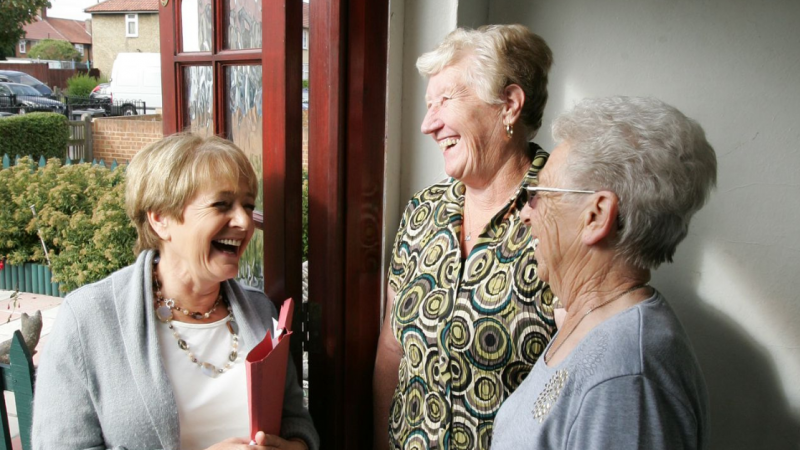
On an otherwise disappointing night 15 years ago, Labour activists celebrated in east London as the British National Party were trounced in Barking.
While the 2010 general election saw Labour ousted from power, Margaret Hodge not only defended her seat from the BNP’s Nick Griffin, but increased her share of the vote.
“Tony Blair wrote this really lovely letter saying you were the only good news of the night,” Hodge said.
LabourList spoke to Baroness Hodge to mark the anniversary of the ‘Battle for Barking’ to revisit an historic campaign, look at what Labour activists and MPs can learn from it when facing the rise of Reform, and hear her views on the current government’s approach to immigration.
‘It wasn’t apathy that was keeping people at home, it was anger’
The threat of the BNP in Barking did not appear overnight, but several years before, with the far-right party placing third in the 2005 general election with 17 percent of the vote, and gaining 12 council seats the following year.
However, Hodge’s concerns in fact dated back almost a decade before the ‘Battle for Barking’, when turnout dropped significantly in the constituency at the 2001 general election.
“I arrived in Barking in 1994; back then, they used to weigh the votes in, not count them. They never did campaigning – you’d be lucky to get one leaflet through the door. It was a presumed safe Labour seat.
“In 2001, the turnout was around 46 percent and I was really worried. So Deborah Mattinson, a mate of mine, agreed to do a survey and a couple of focus groups in what was one of my most deprived council estates among women. We produced a report – it wasn’t apathy that was keeping people at home, it was anger. And between 2001 and 2006, they found a home to express that anger.”
Hodge said that mood among the electorate hasn’t changed more than 20 years on: “We had a low turnout last time – it’s not apathy, they’re really pissed off.”
READ MORE: Runcorn blame game begins – why did Labour lose?
‘People were quite openly saying to me ‘I’m going to vote BNP’
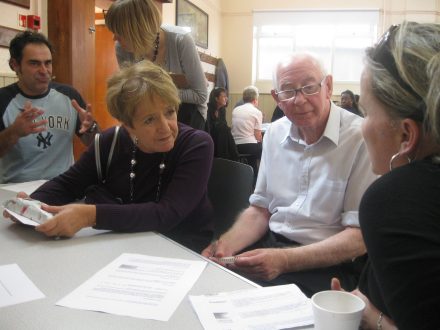
So why were voters angry back in the early 2000s? Hodge explained that housing was a key issue, with poor quality social housing and a feeling among residents that their concerns around quality of life in those estates were not being listened to.
She said that while Barking used to have a lot of council housing pre-Right to Buy, that dwindled as people bought their own homes. This, combined with jobs being axed at the local Ford plant and a sudden transformation in the demographics of the local area, all fuelled anger among residents.
“I started door knocking and it was quite shocking – people were quite openly saying to me ‘I think I’m going to vote BNP’. There is a point at which you would have been ashamed to do so, but they weren’t.”
Speaking in Parliament in the run-up to the local elections, Hodge told LabourList that she could have retired at the 2010 election. She was already in her 60s, but the BNP’s result in the borough in 2006 spurred her on to fight to stay in Parliament.
“Racism is the thing that absolutely makes me go and I just couldn’t let them win – so I decided to fight.
“People were voting BNP as a protest vote. Reform is largely a protest vote. We had to turn that around and rebuild trust – that was the task.”
Added to that challenge were boundary changes, which saw her constituency incorporate three wards that Hodge said had 60 percent support for the far-right.
Scroll to keep reading the story below….
Lessons on rebuilding trust and the ‘virtuous circle’
Hodge said that a key pillar of her campaign to win back trust was bringing her campaign back to local issues.
“People’s politics starts from the very local. It’s not that they’re apathetic – they care what’s outside their front door and in their immediate community.”
The process of regaining trust is a marathon, not a sprint, Hodge explained – and and the core of the strategy was what she calls “the virtuous circle” – a four-stage programme of communication and delivery for residents.
“You’ve got to connect, you’ve got to listen, you’re going to act on what you hear, and then you’ve got to communicate what you’ve done. That is the lesson Labour’s got to learn.”
Rather than holding surgeries, Hodge opted for a different approach. She explained that, in the first instance, she would write to 1,000 constituents inviting them for a cup of tea.
READ MORE: ‘Results so far say one thing: voters think change isn’t coming fast enough’
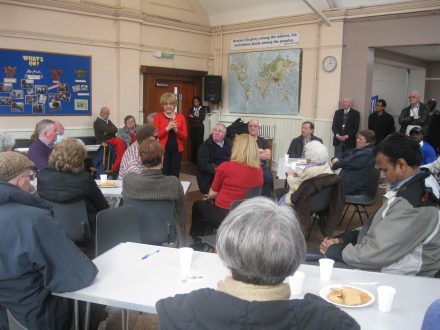
“I’d hire a church hall or something, I’d give them really good coffee and tea and chocolate biscuits – you’re never allowed to do a coffee afternoon without a chocolate biscuit.”
Out of the 1,000, Hodge said around 50 may come to the coffee afternoon, and she would go from table to table and ask what issues they have, helping her to get casework.
At least one local issue would be raised when she brought people together for a collective discussion and, after the meeting, she would act on that local issue, whether it was bin collections or a rat run in their local area.
“Nine times out of ten you could sort the local issue, so I listened – and I wrote to the 1,000 saying thank you for coming. That begins to build trust.”
Dealing with the issue of immigration
Immigration did come up on occasion on the doorstep and at the coffee afternoons, of course, with Hodge writing in The Observer arguing there should be some weighting in priority for the local community for social housing – comments which sparked some criticism from some fellow Labour colleagues, including then-education secretary Alan Johnson and then-London mayor Ken Livingston.
Hodge said she was honest with voters when the issue of immigration was brought up, explaining that immigration was part of modern life and how to make that work in an area struggling with the speed of change.
“They were hard conversations. I’m an immigrant, anti-racism is at really at the core of everything, so I never ever said I’m going to cut the numbers because I didn’t believe it and it wouldn’t have happened.
“I would try and give them a story about why it had happened. I would talk about Right to Buy and how we needed to build more council homes, and it worked sometimes.”
READ MORE: ‘‘Labour has lost in Runcorn – here are the eight things the party should do now‘
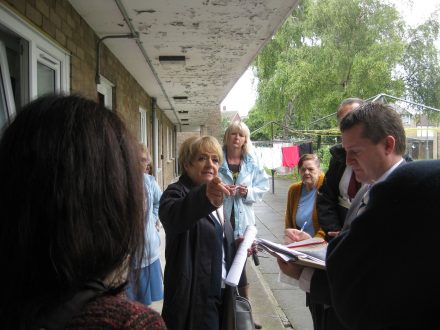
On occasions it didn’t. Hodge recalled how she tried to ensure open conversation at her coffee afternoons, including with people from different backgrounds sharing their experiences – with some leaving with more compassion than they may have come in with.
Hodge also shared one story when she spoke to a Lithuanian resident while out canvassing. “Eastern Europeans have a propensity not to vote. I spent ten minutes talking to them, saying if Nick Griffin wins, he wants to kick you out. Eventually, they said ‘Alright Margaret, I’ll vote for you, but you’ve got to do something for me – you’ve got to kick out those Romanians.'”
‘We never went out from the Labour Party – we were the Margaret Hodge team’
In a documentary about the 2010 election in Hodge’s constituency called ‘The Battle for Barking’, Hodge is seen telling her team that polling in the area suggested that she had more credibility at the time than the Labour Party as a whole.
With that in mind, Hodge said that, when she and the team would go canvassing, “we never went out from the Labour Party”.
“We were the Margaret Hodge team. Sometimes we would have a petition – the number 5 bus didn’t go to the hospital, it was a fantastic campaign.
“You’d open up with saying ‘Did you know Margaret has got that bench put up on the green space down there. Did it make things better? What else would you like us to do in the area?’ “It’s all things local and then you’d engage with them. At the end of the conversation, you would end by saying we’re trying to see whether people voted at the last election. You would get much more accurate data about whether people voted.”
‘Barking was just like the Red Wall – we were just there a little earlier’
In the election, Hodge increased her majority and share of the vote, while Nick Griffin placed third, with a share of the vote lower than the BNP received in the previous election. The BNP also went on to lose every seat they had gained on Barking and Dagenham council.
In her speech, she said: “On behalf of all the people in Britain, we in Barking have not just beaten, but smashed the attempt of extremist outsiders. The message from Barking to the BNP is clear – get out and stay out.
“You’re not wanted here, and your vile politics have no place in British democracy. Tonight we’re giving you a clear message – pack your bags and go.”
Subscribe here to our daily newsletter roundup of all things Labour – and follow us on Bluesky, WhatsApp, Threads, X or Facebook.
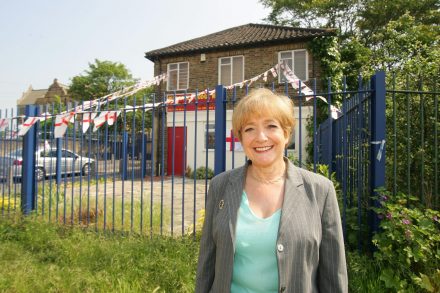
With Reform and Nigel Farage riding high in the opinion polls, Hodge offered a warning: “If Labour don’t learn the right lessons, we won’t defend against the extreme right.”
“Barking was just like the Red Wall, we were just there a little earlier. When I came back in 2010, I tried to talk to Red Wall [MPs] but they were so used to their old habits – you spent your time with the trade unions and with party activists, and campaigning just meant putting leaflets through the door which no-one read.”
She offered praise for the new intake of Labour MPs, however: “I think the young ones understand it – and it’s hard work. I think any of them can turn it around – what I am building is an M. Hodge brand and a connection. It’s not that complicated, it’s not that complex – and I think that face-to-face contact still matters.”
While she acknowledges that her fight against the BNP took place in a “whole different landscape” to elections today, with social media still in its infancy in 2010, Hodge said that her methods still hold up 15 years on.
‘We’ve got to have the guts to change the discourse’
As my time with Baroness Hodge came to an end, she issued a further notable message, however – suggesting the Labour leadership needs to “change the discourse” on immigration.
“I’ve just come out of six months of pretty intensive hospital care. I went in on a Sunday to have an ultrasound scan on my kidney. Two people saw me – one was Nigerian and the other Bangladeshi.
“Politics is often just about voice, and we’ve got the extreme right at the moment who have captured that agenda and we’ve got to have the guts to change the discourse.”
Read our coverage of the fallout from the 2025 local election results:
- Council by council results: Labour gains and losses – and its position in each mayor race
- Starmer: ‘Labour must go further and faster to deliver after Runcorn defeat’
- Runcorn blame game begins – why did Labour lose?
- ‘Labour has lost in Runcorn – here are the eight things the party should do now‘
- MPs who could lose their seat on Runcorn by-election swing to Reform
- ‘Results so far say one thing: voters think change isn’t coming fast enough’
- SHARE: If you have anything to share that we should be looking into or publishing about this story – or any other topic involving Labour– contact us (strictly anonymously if you wish) at [email protected].
- SUBSCRIBE: Sign up to LabourList’s morning email here for the best briefing on everything Labour, every weekday morning.
- DONATE: If you value our work, please chip in a few pounds a week and become one of our supporters, helping sustain and expand our coverage.
- PARTNER: If you or your organisation might be interested in partnering with us on sponsored events or projects, email [email protected].
- ADVERTISE: If your organisation would like to advertise or run sponsored pieces on LabourList‘s daily newsletter or website, contact our exclusive ad partners Total Politics at [email protected].



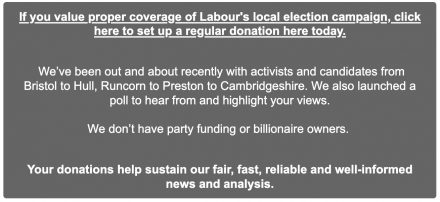

More from LabourList
Antonia Romeo appointed to lead civil service as new Cabinet Secretary
‘If Labour is serious about upskilling Britain, it must mobilise local businesses’
Stella Tsantekidou column: ‘What are we to make of the Labour Together scandal?’